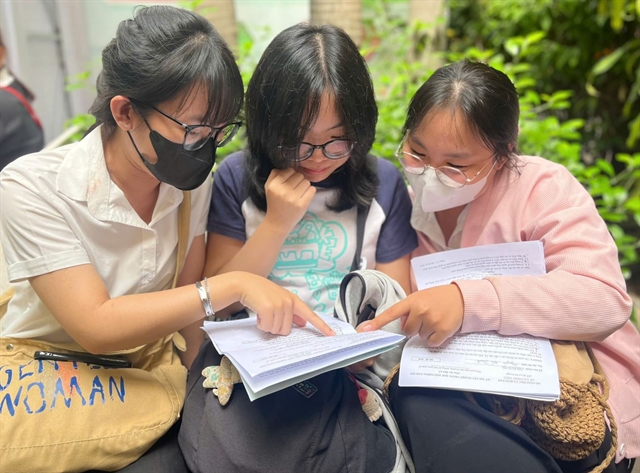 Society
Society

 |
| Illustration photo: School must be a happy place for children to look forward to every day. — VNA/VNS Photo |
HCM CITY — Insulting words, disdainful looks, or insensitive behaviour at school can cause deep wounds, silently eroding the tender souls of students.
This is a wake-up call about a reality that must be taken seriously by families, schools and society.
It is not only physical blows or acts of bullying that leave scars – psychological violence in the classroom is also inflicting lasting wounds.
Many students fall into psychological crises, fear and even depression when they are isolated in the very environment that is supposed to nurture safety and love, experts warned.
Isolated in the classroom
N.M.A., an 11th grader in HCM City, was once a lively student who loved school and extracurricular activities. But everything changed after she had a permitted day off school in October 2024.
Her mother had notified the school via the official school app but forgot to inform the homeroom teacher directly. That day, during Literature class, the girl was punished by being made to stand for 45 minutes despite being unwell.
“I went to apologise to the teacher and explained why I had not reported it in time, but she insisted that parents must not interfere in how she disciplines students,” the mother recalled.
She thought the matter would end there, but her daughter was subsequently subjected to psychological isolation in class.
“The teacher often spoke about betrayal and revealing internal information, and stared at my child, scrutinising her as if to find out who had ‘reported the teacher.’ Even when my daughter phoned me to ask for money, classmates whispered about it and told the teacher,” she said.
“The pressure became unbearable. Friends who had once been close to my daughter began to change their attitudes, siding with the teacher. She gradually became a ‘thorn in the side,’ isolated by both the teacher and classmates.
“Her health also suffered. One time when she asked to go to the infirmary for stomach pain, the teacher followed her down and then scolded the class monitor for ‘covering up’.
“In Literature class, although she volunteered to answer questions, she was repeatedly ignored. When she was finally called on, a classmate whispered something and the teacher gave my daughter zero marks, accusing her of not taking the lesson seriously.”
According to her, the worst incident happened two months later, when the teacher told the class: “Shall we expel her from the school?” then shouted: “Go ahead, complain — I would fight to the end. If I had the authority, I would kick her out right now.”
Some students even echoed the teacher’s words, making the girl feel completely cornered.
Previously, M.A. had loved going to school, cherished her friends, and participated in summer activities and outings around the city.
Now she is afraid of school, withdrawn, sleepless and constantly feels unsafe and threatened.
“If we had not detected the problem early and stood closely by her side, something tragic might have happened. I earnestly hope the school and the city’s education authorities will step in, listen to students and parents and ensure my child and others can learn in a truly happy school environment,” the mother said.
M.A. is not the only student experiencing a psychological crisis. Many others also silently suffer in class from words thought to be mere 'jokes.'
L.D.Th., a 12th grader in Tăng Nhơn Phú Ward, was constantly teased for being chubby. Remarks such as “fat boy,” “pig,” or “as big as a jar” were repeated daily, driving him to insecurity and fear of interacting with peers and teachers.
His mother said: “My son was a good student, obedient and kind, but after being insulted repeatedly, he no longer wanted to go to school or join class activities despite encouragement from me and his homeroom teacher. Some days he would come home crying, asking me, "Mum, am I really so ugly that nobody wants to play with me?" Hearing that broke my heart — he had not harmed anyone, so why did he deserve such cruel words?”
‘Scars’ in the soul
Commenting on the situation, a teacher at Phước Long High School in HCM City, Nguyễn Thị Hồng, said that body-shaming by students and even between adults and students, remains widespread.
While many dismiss it as trivial, such remarks can inflict deep wounds on children’s souls. Some pupils wear masks all day to hide, afraid to speak up in class or appear in front of others. This leads them to withdraw, badly affecting both learning and mental health.
Nicknames like "bamboo pole," "shorty," or "fatty" are gradually becoming a 'toxic culture' of invisible violence in schools.
To address this, teachers must take the lead in promoting respect for differences, integrating such lessons into Literature, Civic Education, Moral Education, and thematic sessions.
Above all, schools must create an environment where students feel safe and protected when they speak up, Hồng said.
The growing isolation of students in class, in society, or within communities is becoming alarming.
According to psychologist Dr Phạm Thị Thúy, a lecturer at Hồ Chí Minh Political Academy Region 2, the number of cases seeking counselling for psychological crises is rising, with some falling into severe depression.
Thúy explained that the causes stem from three sources: students themselves, the school, and the family.
Lack of communication skills, differences in appearance, academic performance, or personality can make children targets of exclusion. Teachers who fail to recognise the signs or who inadvertently discriminate worsen the problem.
Meanwhile, strict or unsympathetic parenting leaves children withdrawn and unable to integrate. More worryingly, online bullying on social media has intensified school violence.
According to head of the Neurology Department at Gia Định People's Hospital Dr Võ Văn Tân, school psychological issues cannot be solved individually; they require the cooperation of teachers, parents and the students themselves.
For teachers, what matters most is to change the educational mindset. Teachers are not only responsible for teaching academic knowledge but also for shaping students’ character. When students make mistakes, it is better to criticise privately and gently, avoiding damage to their self-esteem. In addition, it is necessary to create opportunities for students to express emotions and share their thoughts, he advised.
For schools, life skills education, communication skills and emotional management should be incorporated into the curriculum. These skills need to be taught systematically, not just as formal extracurricular activities. Through life skills lessons, children will become more confident in communication, more self-assured and able to protect themselves against isolation in class.
Parents should spend more time with their children. It should not only be about asking, “What score did you get today?” but also, “Were you happy?”, “Was there anything that made you sad?”, and “Do you need support from Mum and Dad?”
Parents should learn how to listen to and share with their children, rather than just assigning tasks. Sometimes, just a hug or a simple “I understand you” is enough to pull a child back from the brink of depression.
Moreover, if parents notice abnormal signs such as insomnia, loss of appetite, or loss of interest in favourite activities, they should actively seek help from psychologists rather than waiting until it is too late, the doctor said. — VNS




